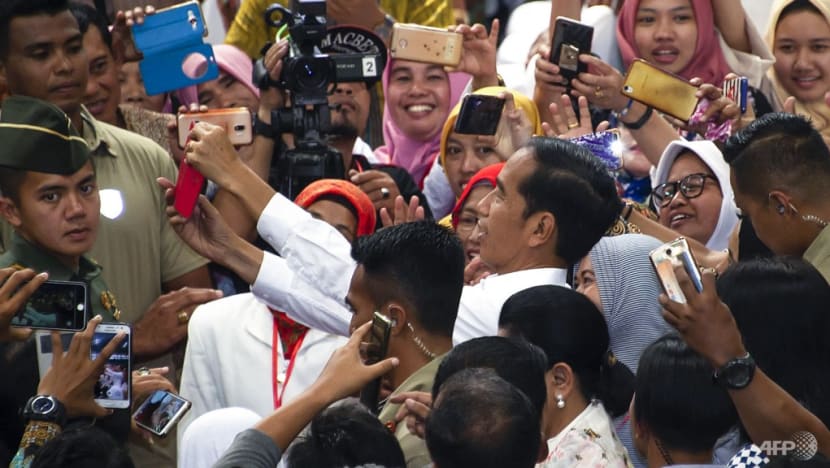Commentary: How will voters swing in Indonesia’s 2024 general elections?
Gen Zs, millennials, TikTok and climate change: It’s going to be a numbers game for next year’s Indonesian presidential candidates, says an observer.

Indonesia's President Joko Widodo taking a selfie with his supporters during an election campaign stop in Sragen, Central Java province on Apr 3, 2019. (Photo: AFP/Juni Kriswanto)
JAKARTA: Indonesia, the world’s third-largest democracy, is set to hold its next general election on Feb 14, 2024. The poll will decide the country’s president, vice president, People's Consultative Assembly - which consists of the House of Representatives and the Regional Representative Council - and members of local legislative bodies. Indonesia’s Home Affairs Ministry reports that as many as 204 million voters are enrolled this time around.
The outcome will be decided by a number of factors that differ from previous elections. First, a demographic dividend means that millions of working-age Gen Zs and millennials will be eligible to vote, with the number estimated at 54 per cent of the total electorate. In 2014 and 2019, millennial voters were credited with being the deciding factor in the outcome of those two elections. Indeed, candidates specifically targeted their campaigns to millennial voters.
Next year’s elections, however, will be different. The focus this time will be on issues that resonate with Gen Z voters. Most of them are university students and would-be job seekers. Lack of employment opportunities, diminishing access to financial assistance and health care, and climate issues will likely influence the way they vote and will drive the candidates’ campaign season.
RISE OF NEW MEDIA
Second, during the 2014 and 2019 presidential elections, social media platforms such as Facebook and Twitter played a pivotal role in the campaigns of presidential hopefuls. This time, however, the rising popularity of Chinese social media platform TikTok will most likely take centre stage, replacing Twitter and Facebook, which are now associated with baby boomers and an older generation of users.
TikTok is now one of the most popular media platforms in Indonesia, with around 99 million monthly active users in April 2022, second only to the United States. Candidates who make the most of the platform have the potential to gain significant advantage.
Podcasts are also gaining popularity in Indonesia. The medium was in its infancy during the previous elections, but today an increasing number of Indonesians listen in, and the number of podcasts being broadcast in the country, including those in Bahasa Indonesia, and those about political issues, are on the rise.
In the lead-up to an election year, Indonesia faces challenges tougher than those of 2014 or 2019.
PAST VERSUS THE PRESENT
Third, in 2014, when Joko Widodo and former general Prabowo Subianto ran for presidency, the narrative was about “the past versus the present”. Prabowo was seen to represent “the past” due to his ties to the New Order regime, while Jokowi was considered “the hope” or “the future”. The narrative advantaged Jokowi, who appeared more able to attract Millennial voters than Prabowo.
For the next elections, however, potential candidates are likely to represent “the present”, with the exception of Prabowo who at 71 is running for election once again. The majority of candidates projected to run in 2024 are under 60 years of age and none is considered to have ties to “the past”.
In the lead-up to an election year, Indonesia faces challenges tougher than those of 2014 or 2019. The country is still reeling from COVID-19 and remains in the recovery phase. Unemployment continues to rise. The prospect of global recession looms over the country’s economy and threatens its post-pandemic recovery.
In short, things are harder in Indonesia than they were five or 10 years ago. In light of those challenges, voters expect their future leader to come up with effective solutions to address those issues.
In Indonesian politics, the critical decision for voters is not whether to vote Left or Right, but about what candidates can offer to make life more bearable for ordinary citizens.
Muhammad Ersan Pamungkas is a Jakarta-based linguist and translator. This commentary first appeared on Lowy Institute's blog The Interpreter.
















